Corsair AX1500i Titanium PSU Review
Today, we're taking a look at Corsair's flagship power supply unit. The AX1500i is a digital, 1500 watt, 80 PLUS Titanium-rated beast of a PSU!
Why you can trust Tom's Hardware
Efficiency, Temperature And Noise
Efficiency
Our efficiency testing procedure is detailed here.
Using the results from the previous page, we plotted a chart showing the AX1500i efficiency at low loads, and loads from 10 to 110 percent of the PSU's maximum-rated capacity.

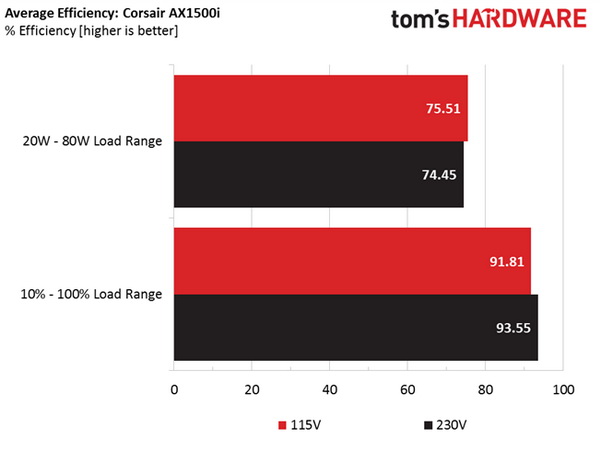
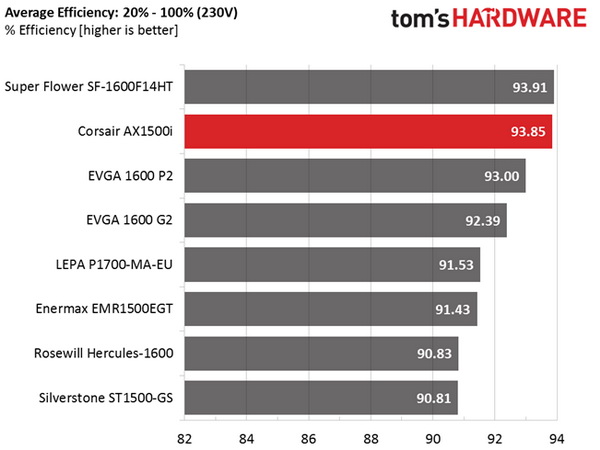
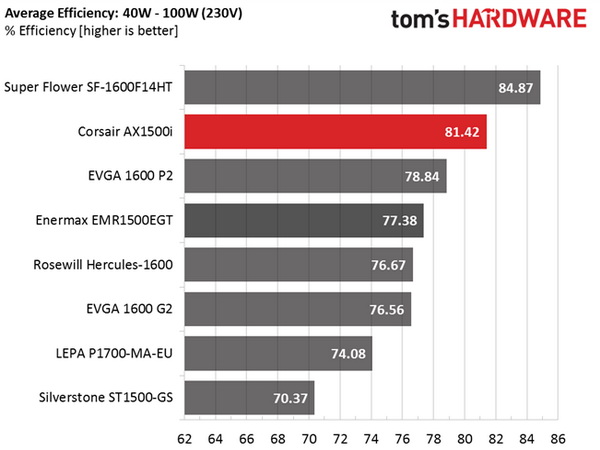
The efficiency difference between 115V and 230V input is large, because this is a high-capacity unit. Hence, at very high loads, the increased amperage with 115V leads to high energy losses. The only PSU that manages to beat the AX1500i in this section is the Super Flower Leadex 1600 Titanium, which uses one of the best analog platforms available on the market today. So, it seems that analog designs can still outperform the high-end digital PSUs, at least in some critical areas.
Efficiency At Low Loads
In the following tests, we measure the efficiency of the AX1500i at loads significantly lower than 10 percent of the device's maximum capacity (the lowest load the 80 Plus standard measures). The loads we dialed were 20, 40, 60 and 80W. This is important for representing when a PC is idle, with power-saving features turned on.
| Test # | 12V | 5V | 3.3V | 5VSB | Power (DC/AC) | Efficiency | Fan Speed | Fan Noise | PF/AC Volts |
|---|---|---|---|---|---|---|---|---|---|
| 1 | 1.217A | 0.502A | 0.485A | 0.200A | 19.69W | 58.15% | 0 RPM | 0 dBA | 0.885 |
| 11.987V | 4.994V | 3.295V | 4.988V | 33.86W | 115.1V | ||||
| 2 | 2.460A | 0.999A | 1.000A | 0.400A | 39.75W | 74.66% | 0 RPM | 0 dBA | 0.950 |
| 11.982V | 4.991V | 3.295V | 4.980V | 53.24W | 115.1V | ||||
| 3 | 3.706A | 1.496A | 1.515A | 0.599A | 59.83W | 83.43% | 0 RPM | 0 dBA | 0.968 |
| 11.980V | 4.989V | 3.294V | 4.972V | 71.71W | 115.1V | ||||
| 4 | 4.942A | 2.004A | 1.999A | 0.803A | 79.77W | 85.78% | 0 RPM | 0 dBA | 0.982 |
| 11.977V | 4.991V | 3.296V | 4.970V | 92.99W | 115.1V |
With 20W load, efficiency was pretty low; however, in the next three tests it was much higher, and with 60W and 80W loads it easily passed the 80 percent mark.
Corsair Link Screenshots
Below you will find screenshots of the Corsair Link software, which we took during the light-load test sessions.
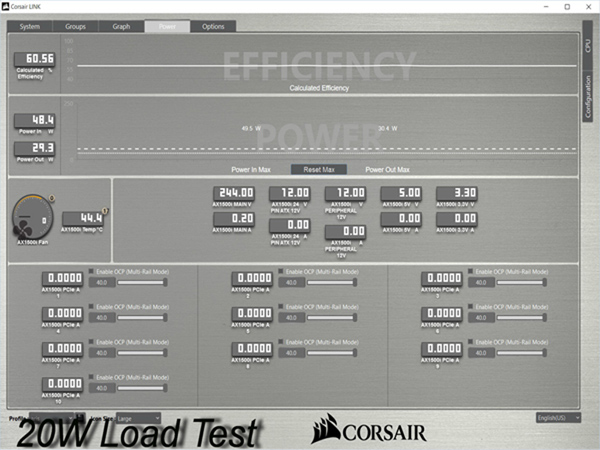
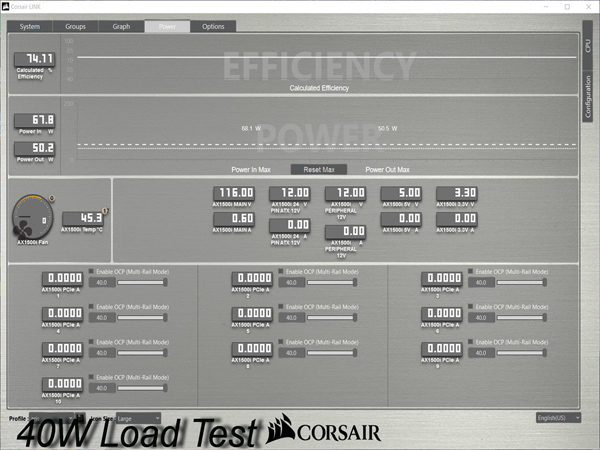
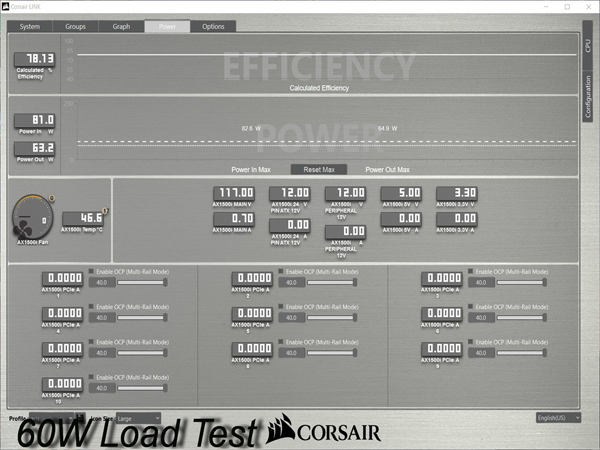
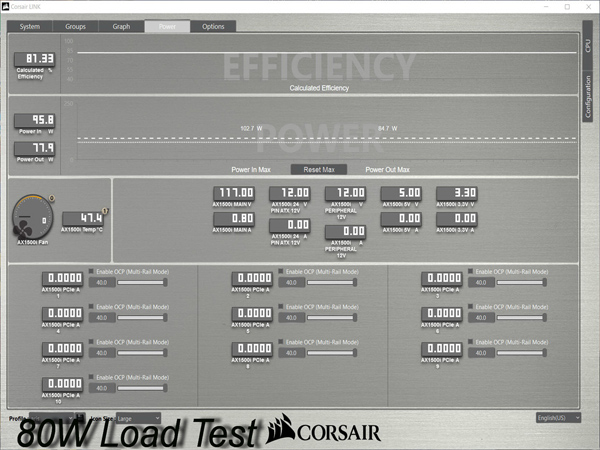
With 20W and 40W load, the readings of the Corsair Link software were much closer to the actual results as compared to the results with 60W and 80W load.
Get Tom's Hardware's best news and in-depth reviews, straight to your inbox.
5VSB Efficiency
The ATX specification states that 5VSB standby supply efficiency should be as high as possible, recommending 50 percent or higher efficiency with 100mA of load, 60 percent or higher with 250mA of load and 70 percent or higher with 1A or more of load.
We will take four measurements: one each at 100, 250 and 1000mA, and one with the full load the 5VSB rail can handle.
| Test # | 5VSB | Power (DC/AC) | Efficiency | PF/AC Volts |
|---|---|---|---|---|
| 1 | 0.101A | 0.51W | 63.75% | 0.040 |
| 5.068V | 0.80W | 115.1V | ||
| 2 | 0.251A | 1.27W | 73.84% | 0.084 |
| 5.063V | 1.72W | 115.1V | ||
| 3 | 1.001A | 5.04W | 80.38% | 0.256 |
| 5.037V | 6.27W | 115.1V | ||
| 4 | 3.502A | 17.34W | 80.76% | 0.474 |
| 4.952V | 21.47W | 115.1V |
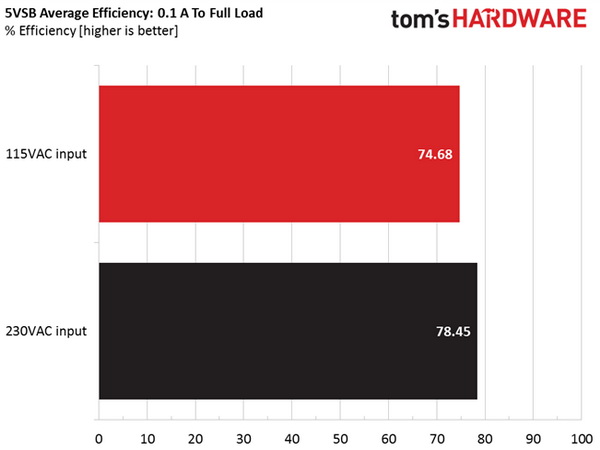
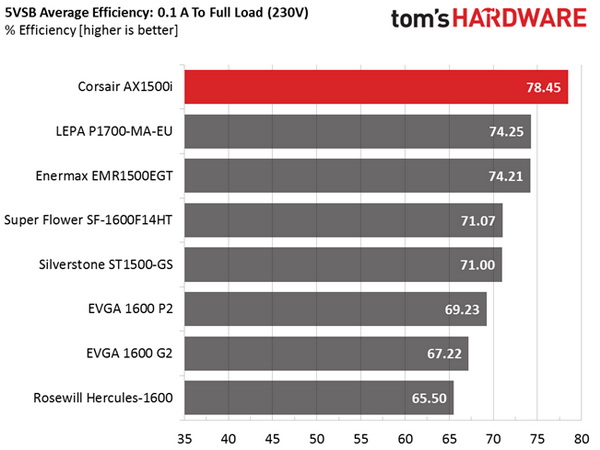
Although it is analog-controlled, the 5VSB rail is highly efficient, with two readings exceeding the 80 percent mark, which is typically pretty hard for this rail to achieve.
Power Consumption In Idle And Standby
| Mode | 12V | 5V | 3.3V | 5VSB | Power (AC) | PF/AC Volts |
|---|---|---|---|---|---|---|
| Idle | 11.975V | 5.007V | 3.304V | 5.008V | 14.64W | 0.632 |
| 115.1V | ||||||
| Standby | 0.21W | 0.010 | ||||
| 115.1V |
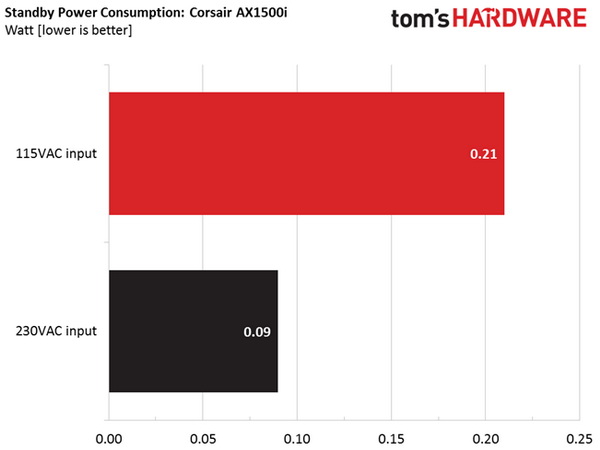
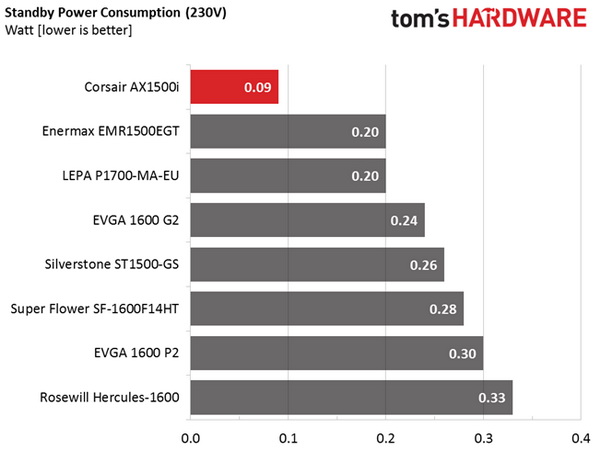
In the table above, you'll find the power consumption and voltage values of all rails (except -12V) when the PSU is idle (powered on, but without any load on its rails), and the power consumption when the PSU is in standby mode (without any load, at 5VSB).
This is the first time that we tested a PSU with lower power consumption at idle with 230V rather than with 115V. All the other PSUs we have tested so far had lower vampire power with 115V input.
Fan RPM, Delta Temperature And Output Noise
Our mixed noise testing is described in detail here.
The first chart below illustrates the cooling fan's speed (RPMs), and the delta between input and output temperature. The results were obtained at 38 C (100.4 F) to 49 C (120.2 F) ambient temperature.
The next chart shows the cooling fan's speed (RPMs) and output noise. We measured acoustics from one meter away, inside a small, custom-made anechoic chamber with internals completely covered in soundproofing material (be quiet! Noise Absorber kit). Background noise inside the anechoic chamber was below 18 dB(A) during testing, and the results were obtained with the PSU operating at 38 C (100.4 F) to 49 C (120.2 F) ambient temperature.
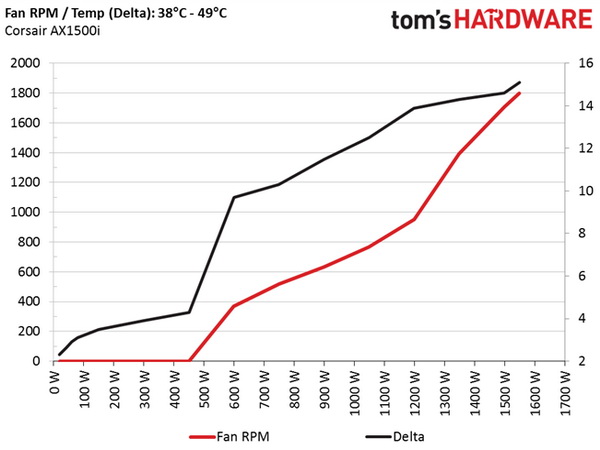
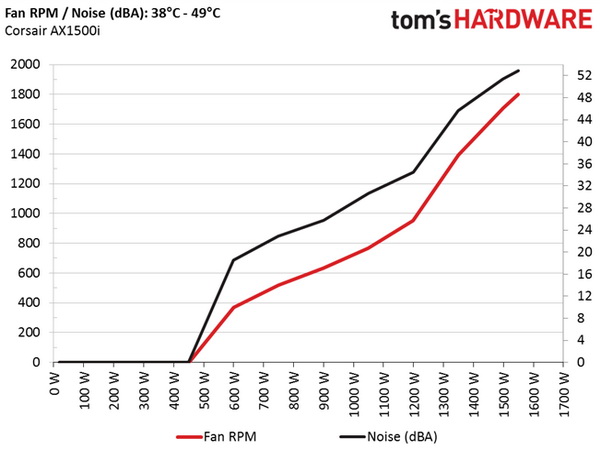
The following graphs illustrate the fan's output noise and speed over the entire operating range of the PSU. The same conditions of the above graph apply to our measurements, though the ambient temperature was between at 28 C (82.4 F) to 30 C (86 F).
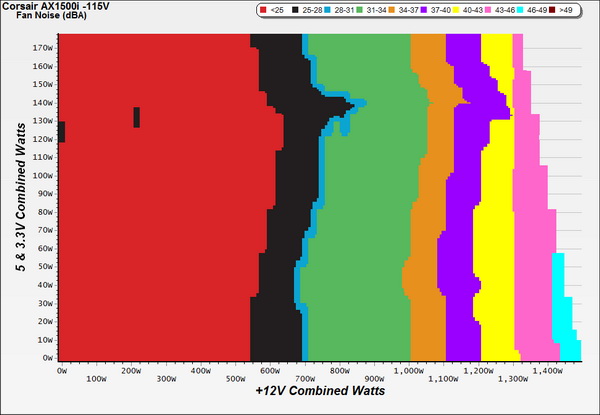
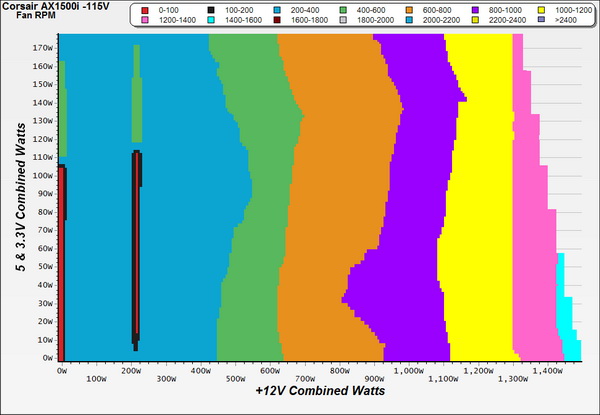
This is a very quietly operating PSU, which is amazing, considering its huge capacity. Up to around 1.2 kW of load, the unit's noise stays below 40 dBA, and at low to mid loads it is below 25 dBA, making the PSU almost inaudible in this operational range.
Current page: Efficiency, Temperature And Noise
Prev Page Load Regulation, Hold-Up Time And Inrush Current Next Page Cross-Load Tests And Infrared Images
Aris Mpitziopoulos is a contributing editor at Tom's Hardware, covering PSUs.
-
Nuckles_56 For such an expensive unit, why on earth did they put the CapXon caps in rather than a complete set of Japanese ones?Reply -
basroil Wow, this thing has almost as good of regulation and transient responses as the Seasonic 660XP2! And at 1500W no less... Might be a good PSU for not just 4-way K80 workstations, but also powering 12VDC robots too!Reply -
mctylr ReplyCorsair's flagship power supply unit (PSU) offering, the AX1500i, is the best PSU money can buy today, according to many experts in the field.
Honestly?! Do you believe that anyone can reasonably assume that this is an impartial, unbiased review when that is the review's opening?
Argument from authority (or appeal to authority) isn't what I expect from a Tom's Hardware review. -
Bossyfins ReplyCorsair's flagship power supply unit (PSU) offering, the AX1500i, is the best PSU money can buy today, according to many experts in the field.
Honestly?! Do you believe that anyone can reasonably assume that this is an impartial, unbiased review when that is the review's opening?
Argument from authority (or appeal to authority) isn't what I expect from a Tom's Hardware review.
He said to many others in the field. Pretty sure he is not implying himself. -
jimmysmitty Reply16665297 said:For such an expensive unit, why on earth did they put the CapXon caps in rather than a complete set of Japanese ones?
They are polymer caps, as mentioned, which might not make a difference even if they went with Japanese caps. In fact looking at the results even some that probably have all Japanese caps got beaten in many areas. -
Eggz Good review, but please do something about the large arrows blocking the garphs' labels. I can't read what the data actually presents with that info blocked.Reply
As for the actual unit, we know it's good. This thing's been out for about a year now. We at least now have conformation from a pretty reliable source, so thanks for that!
And for this:
Argument from authority (or appeal to authority) isn't what I expect from a Tom's Hardware review.
What is wrong with appealing to authority? I don't know astrophysics, but I can tell you something about it if an astrophysics professor tells me about it. And how would the professor learn his basic knowledge before becoming a professor? Text books, probably. Who wrote those? Ah, yes authorities in the field!
Dismissing references to authorities, as a non-expert, is stupid. It's essentially saying "Since this person has dedicated his (or her) entire life to researching this topic, I will definitely make up my mind on that topic without considering what he (or she) has to say about it." That falls right under the definition of intentional ignorance.
To be fair, though, the article didn't cite to an actual authority. It assumed that the readers will have familiarity with other rigorous review sites like Jonny Guru, who reviewed the AXi1500 back in April of 2014, giving it the only 10/10 ever with the following comment: http://www.jonnyguru.com/modules.php?name=NDReviews&op=Story&reid=378
I was starting to think nobody would ever send me a unit good enough. People, THIS is what it takes to get a perfect total score from me. Might be the last time you see it, too. Goes without saying I need to slap in that good old recommended logo right here
-
mctylr Reply16667641 said:Argument from authority (or appeal to authority) isn't what I expect from a Tom's Hardware review.
What is wrong with appealing to authority? I don't know astrophysics, but I can tell you something about it if an astrophysics professor tells me about it.
Dismissing references to authorities,
Argument from authority is not about presenting or relaying knowledge from a known authority, but the premise that the argument(*) should be accepted on the basis that it came from an authority, not that the argument should be evaluated and (conditionally) accepted based on its own merit.
(*) or in this context a review
Perhaps I was sloppy in my usage. My concern is that by making such a reference to unspecified experts' opinions, introduces a potential cognitive bias, namely that the reviewer (Aris) expected the review unit to perform to those expectations, and not necessarily report with an impartial review of the unit as received and as actually measured.
While I assume the power supply is of excellent quality, and I have no reason to expect any intentional or deliberate wrong-doing, the opening of a review with such a reference of praise, suggests that they reviewer could be subtlety influenced by these expectations during the review process.
In my opinion such a reference to other reviews / opinions does not belong in a review introduction, but if mentioned it should be brought up during the conclusion of the review.
-
Amdlova I see some corsair s... inside its not better than an evga power, Seasonic all for the win!Reply -
iam2thecrowe Reply16667294 said:16665297 said:For such an expensive unit, why on earth did they put the CapXon caps in rather than a complete set of Japanese ones?
They are polymer caps, as mentioned, which might not make a difference even if they went with Japanese caps. In fact looking at the results even some that probably have all Japanese caps got beaten in many areas.
Here's some opinions of capxon caps: http://www.badcaps.net/forum/showthread.php?t=20979
I know I wouldnt trust them, have seen too many blow, and theres really no reason to cheap out on such a high end psu. But, the reason they used them may have been due to sizing, availability of those specs or something else....... They might measure well when theyre new, but will they last?..... This is something a review can never tell us unfortunately. I guess as long as theyre rated generously, they should be ok, polymer caps will have much less tolerance to overvoltage. -
Eggz Reply16668249 said:
My concern is that by making such a reference to unspecified experts' opinions, introduces a potential cognitive bias, namely that the reviewer (Aris) expected the review unit to perform to those expectations, and not necessarily report with an impartial review of the unit as received and as actually measured.
That's a fair concern generally, but the reasons giving rise to it seem misplaced. The particular place in a review that someone gives praise - beginning, middle, or end - doesn't make much of a difference for anyone who edits their writing, which I'm sure this reviewer does. It's actually good practice to open with lessons learned for this type of article; otherwise, the piece would be meandering and simply take readers through the experimentation process in real time. That's boring and would probably decrease readership.
As for whether to mention (or allude to) other reviews at all, I am not sure it's a good idea for Tom's reviewers to intentionally ignore other reputable reviewers. In all likelihood, many of them are acquaintances from various trade shows. But more importantly, I'd expect a Tom's reviewer to have read all other serious reviews before writing his own. Without doing that, they'd run the risk of writing repetitive information, or worse, writing a less informative review than others currently available. Being familiar with the work of others in your field is part of what builds credibility.
I'm not trying to say that we should pretend Tom's is immune to fallacious logic. It's good to think about those things. My point is just that it didn't seen to present a real problem here.